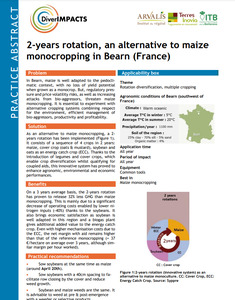{Tool} 2-years rotation, an alternative to maize monocropping in Bearn, France (DiverIMPACTS Practice Abstract). [La rotation sur 2 ans, une alternative à la monoculture du maïs en Béarn (DiverIMPACTS Practice Abstract).] Creator(s): Aliaga, Clémence and Rochepeau, Pierre. Issuing Organisation(s): ARVALIS - Institut du végétal. (2021)
|
PDF
- Published Version
- English
252kB | |
|
PDF
- Published Version
- French/Francais
255kB | |
![[thumbnail of 2022-07-13 17_28_20-.png]](/44283/3.hassmallThumbnailVersion/2022-07-13%2017_28_20-.png)  Preview |
Image (PNG)
- Cover Image
- English
218kB |
Document available online at: https://zenodo.org/record/5547455
Summary
Thanks to the introduction of legumes and cover crops, which
enable crop diversification whilst qualifying for coupled aids, this innovative system has proved to enhance agronomic, environmental and economic performances. On a 3 years average basis, the 2-years rotation has proven to release 32% less GHG than maize monocropping. This is mainly due to a significant decrease of operating costs enabled by lower nitrogen inputs (-40%) thanks to the soybeans. It also brings economic satisfaction as soybean is well adapted in this region and a biogas plant gives additional added value to the energy catch crop. Even with higher mechanisation costs due to the ECC, the net margin with aid remains higher than that of the reference monocropping (+ 37€/hectare on average over 3 years, although similar margin per hour worked).
Summary translation
Grâce à l'introduction de légumineuses et de plantes de couverture, qui permettent de diversifier les cultures tout en bénéficiant d'aides couplées, ce système innovant s'est révélé être une source de performances agronomiques, environnementales et économiques. Grâce à l'introduction de légumineuses et de plantes de couverture, qui permettent de diversifier les cultures tout en bénéficiant d'aides couplées, ce système innovant a prouvé qu'il améliorait les performances agronomiques, environnementales et économiques.
s'est avérée rejeter 32% de GES en moins que la monoculture de maïs.
monoculture de maïs. Ceci est principalement dû à une
Cela est principalement dû à une diminution significative des coûts d'exploitation grâce à la réduction des apports d'azote (-40%) grâce au soja. Elle apporte également une satisfaction économique car le soja est bien adapté à cette région et une usine de biogaz apporte une valeur ajoutée supplémentaire à la culture de rente énergétique. Même avec des coûts de mécanisation plus élevés dus à l'ECC, la marge nette avec aide reste supérieure à celle de la monoculture de référence (+ 37€/hectare en moyenne sur 3 ans, bien que la marge par heure travaillée soit similaire).
| EPrint Type: | Practice tool |
|---|---|
| Teaser: | This tool provides information about a 2-year rotation, its benefits and practical recommendations. |
| What problem does the tool address?: | In Bearn, maize is well adapted to the pedoclimatic context, with no loss of yield potential when grown as a monocrop. But, regulatory pressure and price volatility risks, as well as increasing attacks from bio-aggressors, threaten maize monocropping. It is essential to experiment with alternative cropping systems combining respect for the environment, efficient management of bio-aggressors, productivity and profitability. |
| What solution does the tool offer?: | As an alternative to maize monocropping, a 2-years rotation has been implemented (Figure 1). It consists of a sequence of 4 crops in 2 years: maize, cover crop (oats & mustard), soybean and oats as an energy catch crop (ECC). |
| Country: | France |
| Type of Practice Tool: | Practice abstracts |
| Keywords: | Crop rotation, cover plants, maize, legumes, catch crops |
| Agrovoc keywords: | Language Value URI English rotational cropping -> crop rotation http://aims.fao.org/aos/agrovoc/c_6662 English cover plants http://aims.fao.org/aos/agrovoc/c_1936 English maize http://aims.fao.org/aos/agrovoc/c_12332 English legumes http://aims.fao.org/aos/agrovoc/c_4255 |
| Subjects: | Crop husbandry > Production systems > Pasture and forage crops Crop husbandry > Crop combinations and interactions Crop husbandry > Production systems > Cereals, pulses and oilseeds |
| Research affiliation: | European Union > Horizon 2020 > Diverimpacts France > ARVALIS - Institut du végétal European Union > Organic Farm Knowledge |
| Horizon Europe or H2020 Grant Agreement Number: | 727482 |
| Related Links: | https://organic-farmknowledge.org/tool/44283, https://organic-farmknowledge.org/tool/43540, https://organic-farmknowledge.org/tool/32526, https://syppre.fr/, https://twitter.com/farm_knowledge/status/1582004559269883905, https://www.facebook.com/organicfarmknowledge/posts/pfbid02PmVUeJEFJLdCbVEtq54UqdV4Wzezf5abgvhQLrJ66abFkqjbFttfptjwm2BWaveQl |
| Project ID: | ofk |
| Deposited By: | Rüger, Madelaine Lea |
| ID Code: | 44283 |
| Deposited On: | 18 Jul 2022 13:39 |
| Last Modified: | 02 May 2024 10:31 |
| Document Language: | English, French/Francais |
| Status: | Published |
Repository Staff Only: item control page


